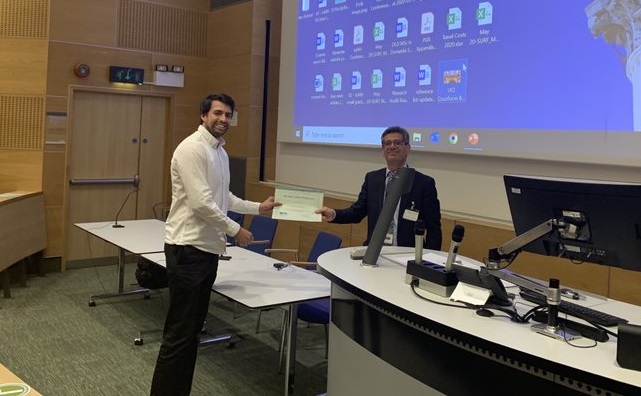Investigating the risk of suicide in patients with cancer: webinar co-hosted by the UCL Institute of Mental Health (IoMH) and the GRID Council (India)
By iomh, on 3 June 2024
Written by Shruti Menon, MSc Student, UCL Division of Psychiatry

I recently attended a webinar held on 22 May 2024 by a team of mental health researchers at the UCL Institute of Mental Health (IoMH) and Generating Research Insights for Development (GRID) Council, India. This was to facilitate a discussion about the quantitative investigation of suicide risk in patients with cancer using routine data in which there was also the opportunity to access Stata/R/Python code and analysis plans from previous analyses. The webinar was supported by the UCL Global Engagement Fund and attended by clinicians and researchers working with data in India, Sri Lanka, Bangladesh, Pakistan, Bhutan, Nepal, Afghanistan and the Maldives. I enrolled as a student in the UCL MSc course in Clinical Mental Health Sciences as I was interested in learning more about how to access and analyse cancer registry data in order to investigate mental health outcomes.
The webinar began with a warm introduction to the event from Dr Neethu Mohan, executive at the State Health Agency of Kerala. Dr Mohan briefly elucidated the aim of the webinar to promote the analysis of cancer registry data linked to mortality data as it would help answer key questions in suicide research.
This was followed by insights into the findings of a systematic review by Heinrich et al (2022) from Dr Alexandra Pitman at UCL Division of Psychiatry. Through her work as a psychiatrist in a cancer team, she described her experience of having observed the impact of cancer on the mental health of people with cancer including their risk of suicidal thoughts. She summarised the findings which indicated that the risk of suicide was significantly higher in patients with cancer compared to the general population. It highlighted how the mental health needs of cancer patients are often overlooked and how factors including time since diagnosis and stage of cancer are linked to the risk of suicide. Dr Pitman emphasised the need to not only monitor the psychological health of people with cancer but to inquire carefully about any suicidal thoughts and screen for untreated depression and anxiety to improve outcomes and well-being. Finally, the Heinrich et al systematic review also brought attention to the geographical gaps in research literature on this topic as the review was limited to studies conducted in high-income countries.

One of the aims of this webinar was to address these geographical evidence gaps.
The webinar then provided participants with an opportunity for discussion in which participants were invited to share their clinical experiences and research priorities. Participants described issues such as medical staff not being trained to screen for mental health problems and suicidal thoughts. Such training could be crucial in vulnerable periods such as immediately after a cancer diagnosis when evidence demonstrates that the risk of suicide is heightened. Important research questions were also raised such as the role of psychiatric conditions in increasing suicide risk in patients with cancer and whether treatment expenditure or lack of social support could potentially heighten the risk of suicide. Participants pointed out the importance of acknowledging to patients how distressing a cancer diagnosis can be so that patients might find it acceptable to disclose any struggles with suicidal thoughts.
Dr Katherine Thackray (née Henson), a data analyst in the National Disease Registration Service (NDRS) at NHS England discussed the methods used in her population-based analysis of English cancer registry data investigating the risk of suicide after cancer diagnosis (Henson et al, 2019). She provided a detailed overview of the analysis, including the statistical techniques used, and sub-groups evaluated. She also outlined the methodological considerations when replicating the analysis such as considering biases in data ascertainment. She highlighted a key limitation of the study which was that due to challenges with linking cancer registry datasets with mental health datasets, the influence of psychiatric disorders on suicide risk in people with cancer could not be explored. She summarised the results of the study which indicated that the risk of suicide was 20% higher in individuals with cancer than in the matched general population, and the increased risk was particularly marked in the first six months post-diagnosis. She also noted that the risk of suicide may have been underestimated as suicide tends to be underreported as a cause of death. Dr Thackray emphasised the implication of these findings namely the potential to prevent these deaths through additional support.
The risk of suicide was 20% higher in individuals with cancer than in the matched general population.
Dr Justin Yang, Research Fellow in the UCL Division of Psychiatry provided a summary of the code used in the study by Henson et al (2019) including details about the variables and confounders to be considered. He also elaborated on various aspects of the analyses such as how to calculate the Standardised Mortality Rate (SMR). This talk illustrated how to conduct the analyses by providing examples of code in different statistical software packages such as Stata, R and Python. Dr Yang discussed the advantages and disadvantages of each of these software packages. While Stata is commonly taught in universities and has supportive online forums, cost can be a limiting factor. R is a free software package with useful statistical functions, however, less formal support tends to be available to researchers using it. While Python has a good capacity to handle large datasets and offers useful statistical functions, it might be the most challenging software to learn. Dr Yang emphasised that the best software to use would be that which one is most familiar with.
A second discussion ensued in which participants identified critical barriers in low and middle-income countries to investigating this research question such as paper records recording deaths, or administrative issues while linking cancer registry data to mortality data. Other important research questions were identified such as exploring the role of acquired capability for suicide in the context of cancer (as patients with cancer may have a reduced fear of death, a reduced pain threshold and/or access to lethal medications) and the need to explore more proximal outcomes than suicide. In particular, risk-taking or self-destructive behaviour such as alcohol use was identified as important to study in people with cancer. The inclusion of participants/researchers with lived experiences in primary research was recognised as beneficial. The participants brainstormed ways to navigate these practical issues, for example by collaborating with data guardians within organisations that collect registry data or using probabilistic data linkage methods to link datasets.

list of 321 cancer registries across South Asia
A wide range of resources were provided on the project website after the session, including annotated data analysis code (with Stata/R/Python versions), a list of 321 cancer registries across South Asia and access to a Slack channel for networking with potential collaborators. Through these resources, the project aimed to create a community of researchers and facilitate collaboration so that future analyses might identify any patient groups at risk who might need increased support. The longer-term goal was therefore to help reduce psychiatric co-morbidity in people with cancer.
I learned a lot about how to evaluate suicide risk in cancer patients using routine data in this webinar and was grateful to all the speakers, the participants for their key insights and the IoMH and GRID council for organising this webinar. I hope that this will foster collaboration among researchers interested in suicide prevention in people with cancer.
Links:
 Close
Close







